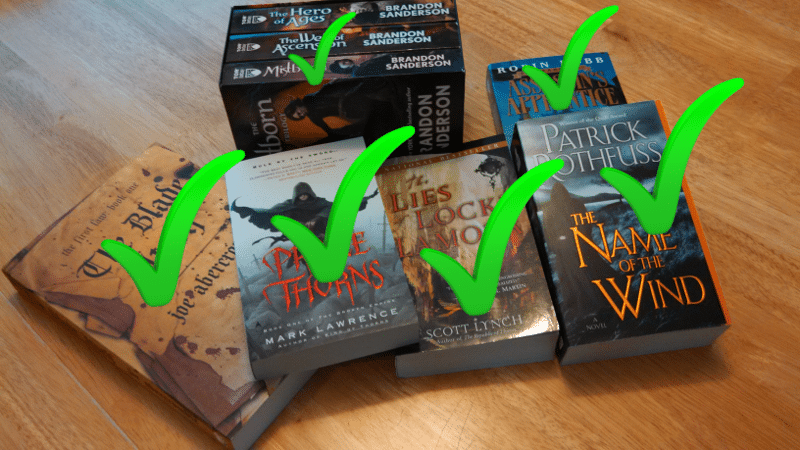
Back at the end of 2013 I laid out a selection of books I intended to read in 2014. Having just finished the first books (I still have the sequels of Mistborn to go, as well as picking up sequels for the other series), I thought it would be a good time for another update.
Assassin’s Apprentice
I had always heard how beautifully written this book was, and it didn’t disappoint. I made this same comment when I read The Name of the Wind, but it applies equally here. However, where The Name of the Wind follows that up with a wonderful, engaging story, Assassin’s Apprentice only has 1/3 of a coming of age story to offer. Unfortunately, Assassin’s Apprentice doesn’t read like a full story, really giving the feel of spending your time reading the build up without much payoff. I’ll get around to finishing the series some day, but it didn’t suck me in to the point where I must run out and grab the second (and third) book.
 Assassin’s Apprentice by Robin Hobb
Assassin’s Apprentice by Robin Hobb
My rating: 4 of 5 stars
My first impression of this book was that it is beautifully written. This is both a blessing and a curse, because the writing is poetic also bogs down the narrative. Sixty pages in, I was wondering when anything significant was going to happen.
The story is told from the POV of a boy who starts the story at age 5 or 6 with no name. The interesting thing about him is that he is not quite either a peasant or a royal, being the bastard son of one of the princes. Unfortunately, a great deal of the book is about his very early childhood, where he is mainly carried along by the events around him, most of which he doesn’t understand.
There is magic in Assassin’s Apprentice, which is rather blandly referred to as the Skill. The main character learns a bit about it, but not enough to form much of an understanding from the reader’s perspective.
Up to this point, I haven’t mentioned the protatonist’s name. I felt that was appropriate, given how far we get into the book without him having one. Eventually they settle on “Fitz,” which is slang for “bastard.”
All in all, I was unimpressed by the plot and characters. Fitz is a very passive presence through much of the book, a receiver of actions rather than an actor of his own. And for a coming-of-age tale – even the first of a trilogy – we don’t get terribly far in his growth. If that was all there was to the book, I’d have given it 3 stars, but the writing is very elegant, which convinced me to bump it a star.
I’ll probably finish reading the trilogy one of these days for a sense of completeness (I’ve heard good things, as well), but this didn’t convince me to rush for book 2.
Mistborn
This is the first book I’ve read by Brandon Sanderson, and I intend to read more.
 Mistborn: The Final Empire by Brandon Sanderson
Mistborn: The Final Empire by Brandon Sanderson
My rating: 4 of 5 stars
I’ve read a lot of flowery fantasy of late, and this was a bit more prosaic. Sanderson doesn’t bog down in a lot of metaphor or deal in words out of the thesaurus. The writing is mechanical, matter of fact, and simple to read.
Mistborn is a fun book, revolving around a group of thieves turned rebels and an idealistic scheme to save an oppressed people. There is action in plenty, and magic to be learned; it’s a book that would make a better anime than a live-action movie.
I will say that the magic system is both the highlight and lowlight of Mistborn. Sanderson is a self-proclaimed guru of limited magic systems (google “Sanderson’s rules of magic”), and the Allomancy developed in Mistborn is a prime example of his philosophy. Over the course of the book, rules are slipped in as the protagonist, Vin, learns the powers and limitations of her abilities in this form of magic. But when you stop to think about it, the book is mainly an exploration of Allomancy. The plot can be deconstructed down to “what would need to happen to show all the powers and limits of this magic system.” This forces a few contrived situations, and a backward look at worldbuilding. Rather than building a world and having a story set in it, Sanderson built a magic system, then put a story around showing it off. The “world” part of the worldbuilding doesn’t play much into Mistborn. While there are mentions of the larger world, it’s mostly people talking about how vast the Final Empire is, while all the on-page action takes place in two cities (and only a small portion in one of them).
Still, all in all, it was an enjoyable work. Paying so much attention to the worldbuilding aspects ruined it with a bit of “behind the curtain at the magic show.” I think if you have a very visual imagination, this one will leap off the page at you.
Want to follow along? Here’s what I’ve got lined up for this year:
- The Name of the Wind by Patrick Rothfuss
- The Lies of Locke Lamora by Scott Lynch
- The Blade Itself by Joe Abercrombie
- Prince of Thorns by Mark Lawrence
- Assassin’s Apprentice by Robin Hobb
- Mistborn Trilogy by Brandon Sanderson

0 Comments